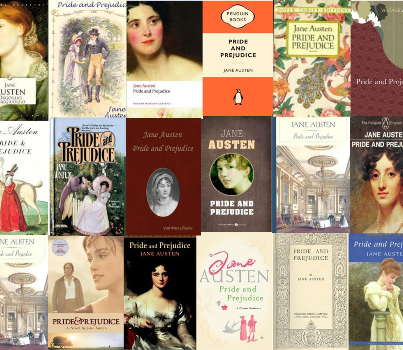 |
| Collage of Pride & Prejudice Book Covers filched from Scottish Book Trust's website |
This blogging malarkey's tricky. Often I think my timing's off. Take Pride & Prejudice for example, two Hundred Years young yesterday. But I didn't blog yesterday; I did my last minute tax return instead. And so I feel I've mis-timed my celebration of this timeless masterpiece. True, I gave it a mention a couple of weeks ago. But that was too early. And today, too late. But I will mention it anyway.
What is it about a book that ends so unrepentently happily-ever-after that appeals to hardened cynics in the 21st Century? On Channel Four News last night, writer Jenny Colgan was asked if she thought Jane Austen was the prototype 'Chick Lit' author. Jenny, whose books I've never read, but whose covers are all the colour of boiled sweets and cupcake* icing, said that she thought Austen was no purveyor of chick lit. Too intelligent, too arch, too ironic, understated, subtle to be stuck into such an insulting, dismissive category.
(*When did fairy cakes morph into cupcakes? Bring back fairy cakes, I say!)
Yet, she has always had her critics. Mark Twain famously said, Everytime I read 'Pride and Prejudice' I want to dig her up and beat her over the skull with her own shin-bone.
And it wasn't only men who criticised her; Charlotte Bronte, author of Jane Eyre couldn't see what the fuss was about either:
I had not seen Pride and Prejudice ... and then I got the book. And what did I find? ... a commonplace face; a carefully fenced, highly cultivated garden, with neat borders and delicate flowers; but no glance of a bright vivid physiognomy, no open country, no fresh air, no blue hill, no bonny beck.
It's not hard to see why these two writers would dislike Jane Austen; both are striving for very different literary effects. Mark Twain's books have exaggerated, larger than life comic elements. Charlotte Bronte - and her sister Emily, come to that - go for passionate, stormy, troubling relationships that cannot be resolved, if they are resolved at all, without first visiting catastrophe upon their characters.
Jane Austen, on the other hand, deftly exposes the ludicrous social norms and economic realities by which we are all - whether we care to admit it or not - to some extent constrained. Maintaining one's wit and integrity under the weight of society's expectations and harsh judgements emerges from Jane Austen's work as a laudable task for
life. That and getting a single man of large fortune to realise he must be in want of a wife.
Pride & Prejudice gets my vote. I read it when I need to soothe myself through life's rough patches. And I'm not the only one; I have several friends who do the same. But it's not just that it's a 'happy-ever-after'. We know the ending before we start. There is something perfectly formed about its narrative. We're with Lizzie Bennet, cheering her on all the way. And even the supremely annoying characters delight. Or rather, Jane Austen's rendering of them delights us.
I wonder if in another 200 years there will be another hapless blogger with bad timing, just missing the anniversary? Or by then, will they be able to tunnel back 410 years in time, pick up vibrations of the people who lived then and translate them into a hologram of Jane Austen sitting at the little table in Steventon finishing the first draft of P&P? Or, ten years later in Chawton, writing to her sister Cassandra when it was finally published, will we be able to look over her shoulder as she pens the words: I want to tell you I have got my own darling child from London. On Wednesday I received one copy ...?
STOP * PRESS * STOP * PRESS
An unapologetic and delighted Hilary Mantel has won the Costa Prize for her novel, Bring up the Bodies, to add to her Booker win in October last year. Click the link to see her on the BBC News accepting the prize for her 'own darling child'.










































